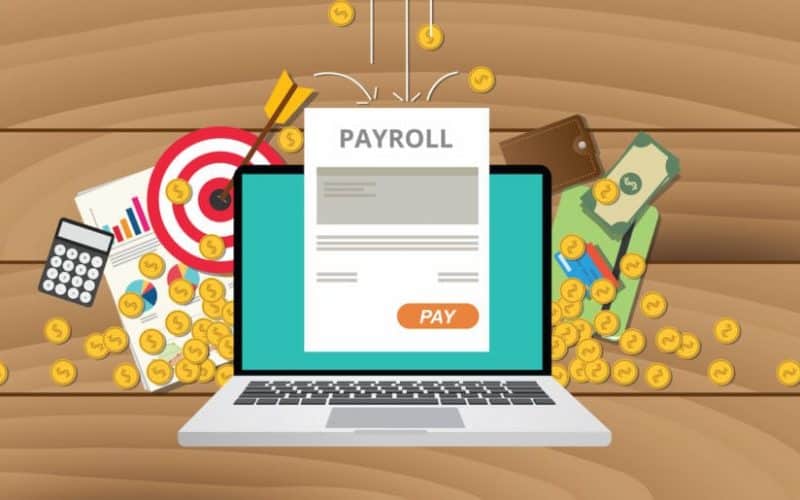Payroll software is a system used by human resources (HR) or payroll professionals to manage the whole life cycle of payroll activities from start to finish. Here are some of the most significant payroll software features, perks, and factors to consider when selecting the finest payroll software for your small business. In addition, we have a review of 5 free payroll software for small businesses.
Payroll Software Definition
Any HR or payroll expert will tell you that payroll processing entails more than just calculating paychecks. Every month, a succession of repetitious duties are performed, ranging from registering employees on the company’s payroll to guaranteeing flawless compliance and maintaining payroll records till exit. Payroll software allows professionals to easily keep track of all of these tasks from one location.
Importance of Payroll Software for your Small Business
Payroll processing and management entail a wide range of actions to protect a business’s most valuable asset – its people. It becomes complex, time-consuming, and occasionally erroneous when done manually, using an antiquated system, or through a spreadsheet. Dedicated payroll software assists payroll specialists in streamlining other payroll duties, allowing HRs and small businesses owners to free up time for critical business projects.
#1. Payroll automation
When you do payroll manually, you leave the door open for unintentional errors that can be very costly. Payroll software can automate both complex and simple activities, allowing you to better manage payroll in your business. Good payroll software keeps the process orderly, simple, and efficient, from preparing payroll through closing off the pay period in your businesses.
#2. Keeping track of payroll expenses
Payroll is a recurrent expense for any firm. As your company expands, your payroll expenses rise, and you require total insight into one of the most significant contributions to your profit and loss statement month after month. Payroll software can provide all of these reports, from employee salary registers to statutes to bonus disbursements, letting you track spending down to the last rupee.
#3. Making taxes less onerous
We’ve seen cases when firms were fined for failing to remit taxes. Payroll software assists you in adapting to new tax laws, selecting statutes that will apply to your organization, controlling PF contributions, and more. Sometimes, differentiating payroll tax from income tax to can be tedious, you can find out more via this blog post. With this, your company can be certain that it is always making accurate tax deductions.
#4. Integration with pertinent business applications
Every month, payroll employees work with several teams to obtain input for payroll processing. The procedure is complex and time-consuming, and with a growing firm, it will only become more difficult. Secure integrations enable you to access data from many teams in a single location. Payroll software that is tightly connected with HR and accounting platforms allows you to consolidate three distinct but critical departments under one roof.
#5. Keeping your payroll data safe
The payroll system houses sensitive information about your employees such as salaries, taxes, bank accounts, and so on. Payroll software with fine-grained access controls can improve the integrity of your payroll data. You may distinguish between the many responsibilities that each department plays and prevent unwanted access. Collaborate securely with staff, show the same interface, but limit payroll staff to only what they need to see based on their jobs.
Small Business Payroll Software Features
#1. Simplified employee onboarding
Every day as a human resources professional, you are inundated with paperwork. Your business payroll software should allow you to rapidly enroll people on the payroll, providing you with complete employee profile information in one spot. This can include general information, salary data, tax and payment information, and so on.
#2. Employees’ salaries can be customized.
Your organization’s hierarchy can span from top executives to interns. Payroll software that is up to date will allow you to tailor earnings, allowances, deductions, reimbursements, and flexible benefit plans to your company’s policies.
#3. Payroll runs with a single click
When you’re ready to run your paycheck, the software should accomplish a slew of payroll-related tasks with a single click. This means that salary computation should be automated, taxes should be calculated following the most recent tax legislation. Also, payslips, salaries, and payroll accounting entries should be handled automatically.
#4. Salary payments made online
Paying salaries on schedule is critical for any company. Payroll software that has active links with reputable banks can assist you with insecure and on-time salary transfers for all of your employees. Some software even allows you to send salaries in advance to chosen employees in addition to your usual pay cycles, allowing you to respond to changing employee situations.
#5. Self-service for employees
This is now a necessity for payroll software because these portals are inherently digital, allowing you to save a significant amount of time. Employees can use self-service portals to retrieve their payslips and tax worksheets, submit investment declarations and proofs, claim reimbursements, and receive deadline reminders in real-time.
#6. Management of leave and attendance
Your payroll software should allow you to conveniently manage your employees’ leave and attendance data in your business organization. It can either be through connections with HRMS or through the ability to accept spreadsheet inputs on leave and attendance data. Your payroll personnel can complete their task more quickly by automatically retrieving leave data from an HRMS system.
#7. Pre-formatted tax returns
For your firm to have a clean tax compliance record, your payroll software must automatically provide reports on all of the essential statutes (PF, ESI, LWF, PT). These pre-formatted tax reports can assist you in completing the tax filing procedure quickly, saving you a significant amount of time in organizing the documents. It’s much better if you can share the reports with your auditors.
Factors to consider when selecting Payroll Software for your Businesses.
Choosing the best payroll system is a critical investment for every business, no matter how big or small. A complicated and inefficient system will waste both time and money. Here are some of the most important variables to consider while selecting payroll software.
#1. Free Trial period
You should be able to test the waters with a fully-featured free trial of the payroll software you choose for your businesses. Before making a decision, you should immediately add a few employees, construct some salary structures, set up a pay schedule, and execute a test pay run.
#2. Simple to use
Because HR professionals are already pressed for time, the learning curve for payroll software should be as low as possible. A clutter-free user interface, contextual feature indications, and an easy user experience ensure that you’ll be able to navigate the payroll software quickly in your businesses.
#3. Scalable
When considering payroll software for your business, keep the long term in mind. You can’t keep switching from one vendor to another every month or year. Depending on the volume of data, the migration effort is steep and time-consuming. The payroll software you use should be in line with your growth goal and should be able to scale with you.
#4. Accessible
Choose a cloud-based payroll software for your business that allows you to access information from home or while traveling using only an internet connection, a web browser, and a suitable device such as a mobile phone or tablet. This allows you to access your data from any location at any time. Employees can follow your announcements and access their payslips on mobile versions of cloud-based tools even while they are not in the office.
#5. Secure
Payroll entails maintaining some of your employees’ most sensitive information, such as personal information, bank information, wage data, and personal account numbers (PANs). Choose a well-known vendor who takes security seriously in order to protect your employees’ data. The vendor should be compliant with international security standards, including an ISO/IEC 27001 security certificate, so you can be confident that they adhere to top-tier processes.
#6. Support
This is a no-brainer. You deal with paychecks every month, and the support crew should be able to assist you when you need it. Approach the seller and find out if they have a good support system in place. Examine how simple it is to contact them, whether via email, chat, or phone calls, and select providers who are well-known for delivering outstanding assistance.
5 Best Free Payroll Software for Small Businesses
#1. BambooHR
Instead of spending hours each month manually transferring data and worrying about accuracy, BambooHR makes payroll administration simple, quick, and stress-free. BambooHR data updates immediately flow into payroll, practically eliminating data duplication. Furthermore, with complete payroll reporting, exceptional customer service, and full-service tax filing, you’ll save time and anxiety on payroll setup, allowing you to focus on other vital tasks.
#2. Paychex Flex
Paychex Flex is an all-in-one payroll and human resources software that you can expand or adapt as your business expands. Use it to conduct payroll and integrate your HR administration, retirement, and insurance management with service tailored to your needs and our expert knowledge of the rules that may influence your organization. For a limited time, get three months of free payroll software processing.
#3. Gusto
Gusto is a cutting-edge online people management software that assists small businesses in managing their staff. Our tools and services assist you in onboarding, paying, insuring, and engaging your workforce on a single, integrated, user-friendly platform used by over 100,000 modern businesses. Gusto makes taking care of your workforce a pleasurable experience, while also assisting you in managing your bottom line and remaining compliant. No matter how intricate the scenario, you’ll feel like a pro. Collaborate with Gusto to build a workplace where everyone thrives.
#4. SurePayroll
SurePayroll’s Small Business Payroll is a leading online payroll software for small businesses nationwide. An award-winning customer service team based in the United States provides personalized support via phone, email, and chat. Small Business Payroll streamlines and ensures the process, allowing payroll to be filed quickly and effortlessly from anywhere at any time. Get a 2-month free trial.
#5. Patriot Payroll Software
Patriot Software provides online payroll services to help you save time and money in your business. Made for small business owners in the United States with 1 to 100 employees. Choose the payroll option that is best for you: Basic Payroll: a monthly fee of $10 plus $4 for each additional employee. Full-service payroll: monthly fee of $30 plus $4 per employee. Paychecks can be deposited directly into your bank account or printed.
Are there any limitations of using payroll software for small businesses?
There may be a cap on the number of employees that can be processed by payroll software designed for small businesses, few opportunities for customization, and a lack of robust reporting options.
What is the process for transitioning from manual payroll to using payroll software?
When making the switch from processing payroll manually to using payroll software, it’s important to consider all of the steps involved in making the change, such as comparing the various options, creating an account, entering employee information, testing the software, and finally processing payroll.
What should I consider when choosing a payroll software solution?
Think about things like how many employees you have, what kind of payroll processing you need, whether or not the software is compatible with your accounting software, how much it will cost, and how well they support you after the sale when selecting a payroll solution.
How do I get started with using payroll software for my small business?
Research available options, compare features and prices, sign up for an account, and set up employee information and payroll processing preferences to get started with payroll software for your small business.
What are the compatibility requirements for using payroll software?
The payroll software you use will determine the system requirements for running it. Internet access, a suitable operating system, and a suitable web browser are all examples of typical prerequisites.
Payroll Software for small business FAQS
Can I do my own payroll for my small business?
If you don’t have extra funds to spend on a payroll service, the DIY approach can save you some cash. Doing manual payroll isn’t the most straightforward task, but armed with the right knowledge, time, and a sturdy calculator, you can do payroll for your small business yourself.
Is QuickBooks worth it for small business?
QuickBooks Online is the best overall accounting software for small businesses of those reviewed. Not only do the majority of small business accounting professionals use QuickBooks Online, but there are also endless online training resources and forums to get support when needed.
How do I learn payroll processing?
Here are six ways to learn payroll and get started.
- Schedule a one-on-one with your accountants. …
- Check out the resources offered by your payroll software provider. …
- Consult the IRS website. …
- Check out resources from your state. …
- Find a trusted business mentor in your field. …
- Take a class.
What is the easiest way to do payroll for a small business?
How to process payroll yourself
- Have all employees complete a W-4 form. …
- Find or sign up for Employer Identification Numbers. …
- Choose your payroll schedule. …
- Calculate and withhold income taxes. …
- Pay payroll taxes. …
- File tax forms & employee W-2s.






